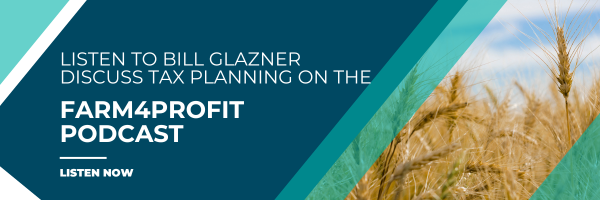Year-End Tax Planning for Farmers & Ranchers
Helping You Keep More of What You’ve Earned
While farming and ranching come with no shortage of challenges—weather, fluctuating markets, labor shortages—the financial side of your operation shouldn’t add to your stress. Smart tax planning can help you protect what you’ve worked so hard to build.
As we approach the end of another challenging year, it’s time for farmers and ranchers to shift focus from the fields to the financials. The unpredictable nature of the past few years, marked by market fluctuations and unprecedented weather events, has underlined the importance of strategic planning, especially in the realm of taxes.
When planning for year-end taxes, it’s crucial for farmers and ranchers to not only consider the current tax year but also to evaluate the long-term financial goals.
Farm Income Averaging
Some years are better than others. That’s the nature of farming. Farm income averaging is a tool used to spread current year farm income out over the prior three years. This can be used to reduce tax liability when current year income is higher than income in one or more of the prior years. To learn more about farm income averaging, click here.
Deferral of Crop Insurance Proceeds
Farmers who receive income from crop insurance in the year of damage to the crop can defer the recognition of this income into the following year. This can be a powerful tool for farmers whose regular business practice is to sell crops in the year after harvest. It can help prevent showing two years’ worth of crop income in one tax year. For more information on the deferral of crop insurance proceeds, click here.
Deferral of Livestock Sales due to Disaster
As extreme weather conditions affect several areas of the U.S., many farmers may face the difficult decision to sell livestock due to shortage of feed resources. In such cases, special tax provisions may enable farmers and ranchers to defer the income from these forced sales. Click to learn two tax deferral strategies that could help mitigate the financial impact of these sales.
Bonus Depreciation & Section 179
Bonus depreciation is yet another year-end tax planning consideration. Farmers who purchased farm assets in the current year can accelerate the depreciation deduction for those assets. Bonus deprecation allows for an 60% write of qualified property placed in service in 2024.
Examples of qualified property include:
- Farm machinery
- Breeding livestock
- Grain bins
- Farm buildings
Section 179 is another method of accelerated depreciation. Section 179 differs from bonus depreciation in several ways. It is limited to $1,220,000 and that limit is reduced by $1 for every $1 over $3,050,000 sent on qualifying assets. It cannot be used to create a loss and can be applied on an asset-by-asset basis to any amount up to 100% of the purchase price. It is not available for multi-purpose farm buildings.
Deferred Payment Contract
A deferred payment contract is an installment sale that allows a cash-basis farmer to sell crops in the current year but not receive payment for the commodity until the following year through a deferred payment contract. Although payment is deferred, the taxpayer can realize the deferred payment as income in the current year or the following year on a contract-by-contract basis. This flexibility can be a valuable tool for tax planning. Read our Deferred Grain Contracts article for more information.
Prepaid Expenses
Cash basis farmers and ranchers can prepay for some supplies that can be deducted in the current tax year, but that will be used in the following tax year. Some examples of supplies that can be prepaid include:
- Feed
- Seed
- Fertilizers
- Similar farm supplies
The amount that can be prepaid is subject to some limitations. Learn more here.
Charitable Giving of Commodities
Farmers who are charitable can gift a commodity, directly to a charitable organization. When a commodity is gifted, it is not subject to income tax. This strategy offers dual tax benefits: it reduces both income taxes and self-employment taxes. Learn more about eligibility and requirements for charitable giving of commodities here.
Questions?
All the above areas can be part of a productive discussion with your farm tax accountant. Contact an Adams Brown farm accountant to discuss your situation.


